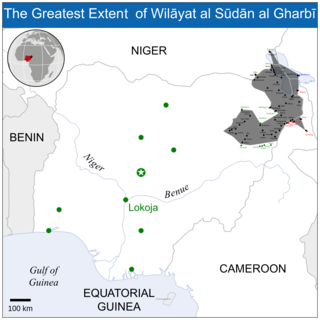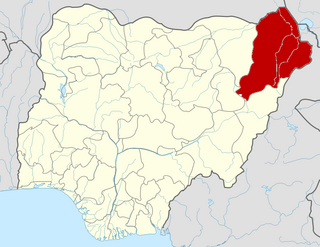
Maiduguri is the capital and the largest city of Borno State in north-eastern Nigeria. The city sits along the seasonal Ngadda River which disappears into the Firki swamps in the areas around Lake Chad. Maiduguri was founded in 1907 as a military outpost by the British and has since grown rapidly with a population exceeding a million by 2007.

Borno State is a state in the North-East geopolitical zone of Nigeria, bordered by Yobe to the west, Gombe to the southwest, and Adamawa to the south while its eastern border forms part of the national border with Cameroon, its northern border forms part of the national border with Niger, and its northeastern border forms all of the national border with Chad, being the only Nigerian state to border three foreign countries. It takes its name from the historic emirate of Borno, with the emirate's old capital of Maiduguri serving as the capital city of Borno State. The state was formed in 1976 when the former North-Eastern State was broken up. It originally included the area that is now Yobe State, which became a distinct state in 1991.

Boko Haram, officially known as Jamā'at Ahl as-Sunnah lid-Da'wah wa'l-Jihād, is an Islamist militant organization based in northeastern Nigeria, which is also active in Chad, Niger, northern Cameroon, and Mali. Boko Haram was the world's deadliest terror group during part of the mid-2010s according to the Global Terrorism Index. In 2016, the group split, resulting in the emergence of a hostile faction known as the Islamic State's West Africa Province.
Damboa is a Local Government Area of Borno State, Nigeria. Its headquarters are in the town of Damboa. It has an area of 6,219 km² and had a population of 233,200 at the 2006 census.

Gwoza is a local government area of Borno State, Nigeria. Its headquarters are in the town of Gwoza, a border town "about 135 kilometres South-East of Maiduguri." The postal code of the area is 610.

The Boko Haram insurgency began in July 2009, when the militant Islamist and jihadist rebel group Boko Haram started an armed rebellion against the government of Nigeria. The conflict is taking place within the context of long-standing issues of religious violence between Nigeria's Muslim and Christian communities, and the insurgents' ultimate aim is to establish an Islamic state in the region.

Abu Mohammed Abubakar al-Sheikawi was a Kanuri terrorist who was the leader of Boko Haram, a Nigerian Islamist militant group. He served as deputy leader to the group's founder, Mohammed Yusuf, until Yusuf was executed in 2009.

The Vanguard for the Protection of Muslims in Black Africa, better known as Ansaru and less commonly called al-Qaeda in the Lands Beyond the Sahel, is an Islamic fundamentalist Jihadist militant organisation based in the northeast of Nigeria. It originated as a faction of Boko Haram, but became officially independent in 2012. Despite this, Ansaru and other Boko Haram factions continued to work closely together until the former increasingly declined, and stopped its insurgent activities in 2015. Since then, Ansaru is mostly dormant though its members continue to spread propaganda for their cause.
Timeline of the Boko Haram insurgency is the chronology of the Boko Haram insurgency, an ongoing armed conflict between Nigerian Islamist group Boko Haram and the Nigerian government. Boko Haram have carried out many attacks against the military, police and civilians since 2009, mostly in Nigeria. The low-intensity conflict is centred on Borno State. It peaked in the mid 2010s, when Boko Haram extended their insurgency into Cameroon, Chad and Niger.
The Konduga massacre took place in Konduga, Borno State, Nigeria on 11 February 2014. The massacre was conducted by Boko Haram Islamists against Christian villagers. At least 62 people were killed.

On the night of 14–15 April 2014, 276 mostly Christian female students aged from 16 to 18 were kidnapped by the Islamic terrorist group Boko Haram from the Government Girls Secondary School at the town of Chibok in Borno State, Nigeria. Prior to the raid, the school had been closed for four weeks due to deteriorating security conditions, but the girls were in attendance in order to take final exams in physics.
Shehu Mustapha Idrissa Timtapronunciation was a Nigerian traditional leader who served as the 3rd Emir of Gwoza from October 1981 until his death in May 2014. He was killed in an attack by Boko Haram terrorists on May 30, 2014.
The following lists events from 2014 in Nigeria.
The Abuja DSS attack was a coordinated terrorist attack by the Islamic group Boko Haram on the Department of State Security, Abuja on 31 March 2014 in a bid to escape from detention. This resulted in the death of 21 insurgents who attempted to escape leaving 2 security personnel severely injured.

Starting in late January 2015, a coalition of West African troops launched an offensive against the Boko Haram insurgents in Nigeria.

On the evening of September 20, 2015, a series of bombings took place in Maiduguri and Monguno, Nigeria, killing at least 145 people and injuring at least 97 others. The majority of casualties occurred in Maiduguri where four explosions killed at least 117 people.

The Chad Basin campaign of 2018–2020 was a series of battles and offensives in the southern Chad Basin, particularly northeastern Nigeria, which took place amid the ongoing Boko Haram insurgency. The Chad Basin witnessed an upsurge of insurgent activity from early November 2018, as rebels belonging to the Islamic State's West Africa Province (ISWAP) and Boko Haram launched offensives and several raids to regain military strength and seize territory in a renewed attempt to establish an Islamic state in the region. These attacks, especially those by ISWAP, met with considerable success and resulted in the displacement of hundreds of thousands of civilians. The member states of the Multinational Joint Task Force (MJTF), namely Nigeria, Niger, Chad, and Cameroon responded to the increased insurgent activity with counter-offensives. These operations repulsed the rebels in many areas, but failed to fully contain the insurgency.
Babagana Umara Zulum is a Nigerian professor and politician. He has served as Governor of Borno State since 2019 under the platform of the All Progressive Congress (APC).
On 23 March 2020, Islamists carried out massacres of soldiers in Chad and Nigeria.

The 7th Division is an infantry unit of the Nigerian Army.














